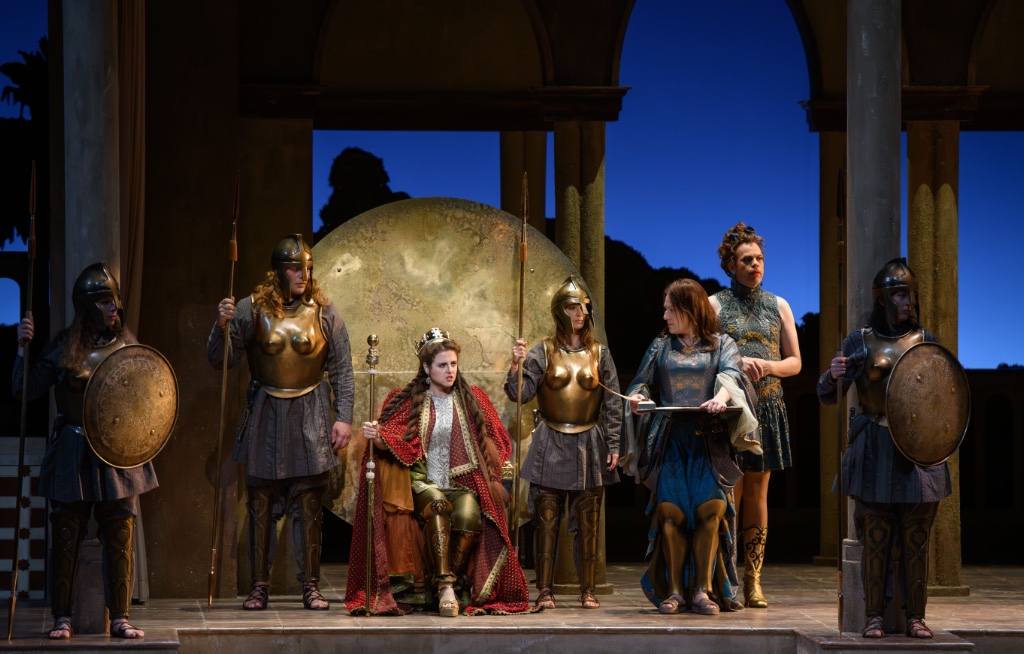
I have long been an admirer of conductor Vincent Dumestre and his excellent period-instrument orchestra Le Poème Harmonique. Specializing in French music from the 17th and early 18th centuries, it has staged and recorded seldom-performed music for over 25 years. Its historically informed production of Molière’s Le Bourgeois Gentilhomme (available on DVD) remains for me one of their finest creations. So when I saw that Dumestre had unearthed the score for an Italian opera, L’Uomo Femina, by Baldassare Galuppi, which has not been revived since the early years after its first performance in Venice in 1762 and that the production was directed by one of my favorite actor/screenwriters, Agnès Jaoui, I leapt at the chance to travel to Dijon for its opening night at the Opéra de Dijon.
One of the features of L’Uomo Femina that must have appealed to both conductor and director is the astonishingly modern premise of its story. A man and his valet find themselves shipwrecked on an island where women govern the men, who are reduced to a subservient role, beautifying themselves for the benefit of their rulers and indulging in frivolities.
The librettist Pietro Chiari, contemporary and rival of the dramatist Carlo Goldoni, had a good knowledge of French theater. Not only did he write a parody of Molière, whose style of comedy he disliked, but he also wrote his own brand of sentimental drama, known as “comédies larmoyantes,” which were popular in France in the mid-18th century. It is therefore more than likely that, in writing the libretto, he had good knowledge of another French dramatist from earlier in the century, Pierre de Marivaux, whose 1725 one-act comedy, L’Île des Esclaves, revolves around a master and his slave being shipwrecked on an island where slaves become masters and masters become slaves.
Given the modernity of the opera’s subject matter, Jaoui might have been expected to update the action and to emphasize the political implications of such a reversal of gender roles, but perhaps wisely she stages the action in a distant age and does not forget the comic roots of both Marivaux’s work and the opera buffa genre. For all the destabilizing and energizing effect of upturned relations between the sexes, all these island plays end conventionally, with the expected roles reimposed at the end.
The lighthearted tone is maintained throughout, and the production remains lively and visually arresting, from the beginning, where a still painting suddenly comes alive, to the end, when a beautiful full moon is outlined against the sky. Jaoui has spoken of trying, along with set designer Alban Ho Van, to create a “feminine” decor, inspired by Eastern harems, populated by men instead of women.
Musically, L’Uomo Femina contains many delights. The rapidity of the recitatives and the sparkling wit of the music must have appealed to the young Mozart, who would have been six at the time of the opera’s first performance. Galuppi was renowned during his lifetime, spending time in London, where Handel was his chief rival, and serving as court composer to Catherine the Great of Russia. If the narrative drive and sheer beauty of Mozart’s arias are sometimes missing from Galuppi’s writing, Dumestre nonetheless makes a convincing case for the revival of this fascinating work.
The arias accompanied by the mandolin are particularly affecting, and all the singers and musicians are uniformly excellent. Eva Zaïcik as Princess Cretidea, who claims the first choice of any man who arrives on the island, sings with both authority and beauty. Victor Sicard as Roberto, one of the shipwrecked men who attracts the interest of both Cretidea and Cassandra (delicately performed by Victoire Bunel), has less interesting music to deliver than his valet Giannino (who far more readily embraces his subservient status and whose arias are delivered with relish by François Rougier) but makes the most of his attempts to subjugate Cretidea to his Western norms.
Of the other singers, mezzo-soprano Lucile Richardot stands out dramatically and vocally as Ramira, who with Cassandra is the first to discover the two men washed up on the shore. Not afraid to coarsen her tone to underline how women are the dominant sex on the island, she commands every scene in which she appears.
Paris-based music lovers who are disappointed to have missed this operatic rarity in Dijon or Caen (where it is being staged at the Théâtre de Caen on November 15 and 16) will have the chance to see it at the Opéra Royal de Versailles between December 13 and 15. For those who live farther afield, a recording of L’Uomo Femina made by Dumestre and Le Poème Harmonique is due to be recorded soon.
Favorite